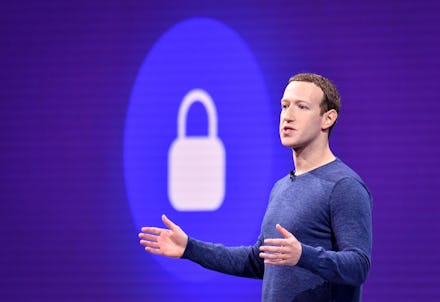Facebook is totally cool with letting politicians lie on its platform

Facebook announced it will not fact-check political advertisements but will allow users to determine what messages will make it to their timelines. Rob Leathern, Facebook’s director of product management, shared the new developments in a blog post Thursday. Facebookers cannot remove ads completely, but they can lessen the amount that pops up while they scroll. Users will also be able to choose how they’re targeted via Facebook’s Custom Audiences control.
“For example, if a candidate has chosen to exclude you from seeing certain fundraising ads because they don’t think you will donate again, but you still want a chance to see those ads, you can stop yourself from being excluded,” Leathern wrote.
Leathern doubled down on Facebook’s refusal to get rid of ads with false or misleading information even though two of its competitors have made moves to quell the influence of political ads.
“While Twitter has chosen to block political ads and Google has chosen to limit the targeting of political ads, we are choosing to expand transparency and give more controls to people when it comes to political ads,” he wrote.
Leathern argued it is up to the government to regulate the content of political marketing. He touted the Honest Ads Act, which would require advertisers to give disclaimers similar to those seen in televised political ads, per Broadcasting+Cable.
“Ultimately, we don’t think decisions about political ads should be made by private companies, which is why we are arguing for regulation that would apply across the industry,” the blog post stated.
This justification is in line with Facebook founder and CEO Mark Zuckerberg’s opinion on the matter. After Twitter banned ads last year, Zuckerberg admitted he didn’t think it was “right for private companies to censor politicians and the news,” according to CNBC. Critics argue Facebook is in practice not a private technology company but a media company, given its increasing influence in digital media revenue and the proliferation of news and opinion articles on its platform.
Leathern said Facebook considered an algorithm change to limit targeting, but decided against it because “85% of spend by U.S. presidential candidates on Facebook is for ad campaigns targeted to audiences estimated to be greater than 250,000.”
Even though Facebook won’t do any fact-checking, Leathern said the advertisers must adhere to Facebook’s Community Standards, "which apply to ads and include policies that, for example, ban hate speech, harmful content and content designed to intimidate voters or stop them from exercising their right to vote,” Leathern explained. “We regularly disallow ads from politicians that break our rules.”
Notably, however, that has not included ads with false information from President Trump. Democratic presidential hopeful Elizabeth Warren also drew attention to the flaws in Facebook's policy by running a political ad that concerned Zuckerberg himself.